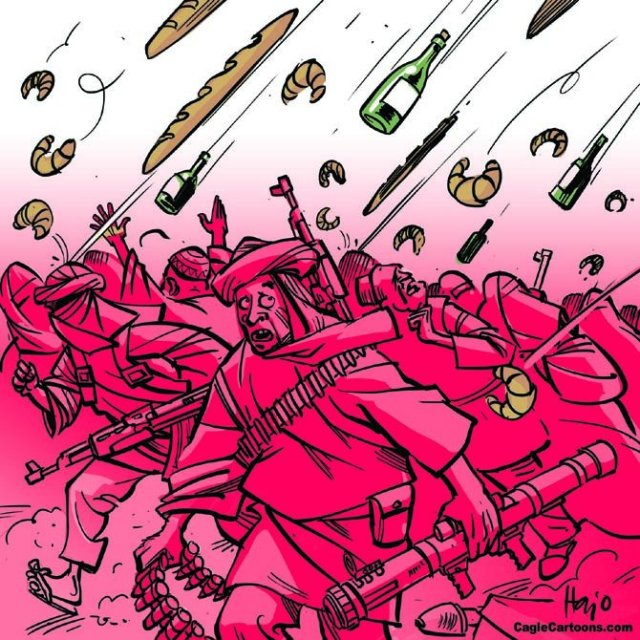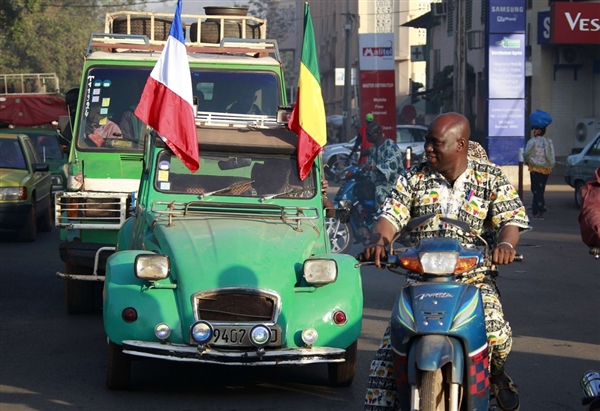A familiar face returns to JiC, as Andrew Jillions joins us for this timely post the need for a human-rights focused approach to France’s intervention in Mali. For more of Andrew’s post, see here. Enjoy!
Where have all the humanitarians gone? It is security, security, security that has dictated the agenda in the week since France’s overnight decision to intervene in Mali. Nary a mention of human rights or humanitarian intervention. This is a big mistake with the potential to undermine longer term attempts to rebuild peace and security in the country.
Mali has for some time now been suffering from a ‘perfect storm’ of high food insecurity, desertification linked to climate change, high youth unemployment, and deep political and ethnic tensions, especially with the Tuareg minority. None of this was helped by the military takeover last March, which triggered the Tuareg rebels’ claim to independence for the Azawad states in the north of the country – a movement which the better organised Islamist forces quickly co-opted.
This is part of the reason that Ban Ki-Moon backed off from supporting the idea of an international intervention back in November. Despite admitting the urgency of the situation facing those living in the areas under the control of the various Islamist forces and the potential good that could be done with a limited intervention, he concluded that the focus needed to be on “initiating a broad-based and inclusive political dialogue aimed at forging national consensus . . . and addressing the long-standing grievances” of the communities in the north.
I didn’t agree with Ban’s reasoning then, and I think there’s every reason to support the French-led mission now. For one, the Islamists seem to have co-opted the legitimate and longstanding grievances of the Tuaregs for their own purposes. The Islamists are in effect an invading force – largely made up of foreigner fighters. More than that, there is very little evidence that ordinary Malians have any cultural affinity for the brutal form of Sharia law the Islamists have implemented in the regions under their control. Peacebuilding will eventually be crucial to resolving the underlying tensions, and the ICC’s timely decision to examine the crimes committed by all parties to the conflict is part of that.
More relevant is that none of this will happen until some attempt is made to stop the systematic abuses committed by the Islamists. And make no mistake, this is despicable stuff. This chilling story from one of the reputed 400,000 refugees and internally displaced peoples (with the UN expecting an additional 700,000+) fleeing the violence tells how a man accused of using tobacco had his hand chopped off. As if that was not enough, “the severed hand was tossed into a vat of boiling water, the man was pinned down and the bent misshapen hand was sewn crudely back onto his stump”.
But this story – and the many others like it – are pushed to the background amid claims that this is an intervention centred on countering the security threat from Islamism. Glenn Greenwald and Stephen Walt both suggest that the Libyan adventure pushed battle hardened Islamists into Mali; that the military coup which destabilized the North was born out of US training, funding and equipment; and that the strategic effects of this intervention will only feed the perception that the West is waging a war on Islam. Which, of course, will only make it ‘necessary’ to intervene in further hot-spots in future.
Others raise the neo-colonial overtones of the intervention as complicating any ‘just’ outcome. France sending troops into Africa? Regardless of whether this ends swiftly, as Alex Thurston points out, the paternalism inherent in French actions raises uncomfortable truths about how the dynamics of colonialism survive in the policy arena today. But this is not the right gloss. It is not how those affected have seen it, with widely reported scenes of Malians waving French flags. Even Mali’s military forces, having lost enough ground to the Islamists, welcomed their old overlords. Whether France was really invited in or not, the relevant point is surely that they have been welcomed in. Surprisingly enough, Nigeria and with it most of Africa also seem to have ignored the neo-colonial gloss, welcoming and partnering with French forces. They are far more worried about the Islamist threat to regional peace and security than about a re-ignition of French colonial ambition.
In the midst of all of this, however, the humanitarian necessity of the intervention fades from view. One of the implications of the realist commentary is that evaluating the intervention as a humanitarian intervention is somehow passé, something for a pre-Afghanistan, pre-Iraq, pre-War-on-Terror world . . . and that this is progress. Intervention should only be evaluated in terms of the strategic necessity of investing one’s blood and treasure, and the potential for a profitable return.
There are legitimate worries that bringing humanitarian sentiment into the analysis can have the unintended effect of compounding the suffering of those on the ground. Paul Rogers makes a convincing case that this is a gift to jihadist propagandists. The road to hell is paved with good intentions and all that.
Regardless, there is every reason to celebrate this as a humanitarian intervention – and to defend it as such. First, it fits squarely within the scope of the responsibility to protect; those living under the Islamist forces have been subjected to systematic and extensive abuses amounting to war crimes and crimes against humanity, which the government in Bamako has been unable to stop.
Second, emphasising the humanitarian aspects of this intervention broadens out the sloppy and irresponsible narrative that this is part of a war against Islam. The hope with clarifying the threshold of the responsibility to protect human rights abuses was that it would bracket off scepticism about the underlying motives for intervening. The abuses being committed by the Islamist forces on the ground should leave no doubt: this is war against injustice, nothing less.
Third, locating this as a humanitarian intervention will force policymakers to think holistically about the next steps for the country – including the need for justice. The French have promised to leave quickly, as soon as the Islamist forces are dealt with (although given the scale of this challenge as reflected in David Cameron’s statement today about the decades long engagement needed in the region, there is a degree of ambiguity in this). The ICC has promised to investigate all sides in the conflict – and if the reports from Amnesty International are to be believed, Mali’s security forces have committed a number of atrocities already. The longer that this is painted as an existential fight against the Islamists, the quicker forces will be to ignore IHL standards.
It is the potential for this intervention to lead to a just and stable peace, and to improved human security, that should be the key metric of success. This is made less likely so long as the world remains focused on the security dimensions of France’s deployment.




Reblogged this on Mali Sources.
Pingback: Mali analysis round-up | The More Things Change
http://www.sudandailypress.net/ Arabic News website from Edmonton Canada
________________________________
Sadly the ICC threat has had no effect as of today, March 15, 2013.
The news comes as the French government recently pledged to tackle human rights abuses within the country after a the UN Commission for Human Rights accused the Malian army of “systematically” abusing the local Arab and Tuareg population living in the African state.
source: http://arabtoday.net/20130315267289/algerian-minister-confirms-diplomatic-trip-to-mauritania.html
UNHRC is wonderful with its majority of dictatorships and human rights offenders seating!
Just to let you know I sourced your blog post in my essay 🙂
Pertaining to the question : Where have all the humanitarians gone?
I had just completed a Harvard Humanitarian Response Course in which one of the lecturers was Claude Bruderlein of Harvard University & the ICRC. I am further intrigued by your article and am in the midst of writing & publishing a book on Humanitarian Responses & Solutions.
What roles do humanitarian actors guided by well-enshrined humanitarian principles & approaches play pursuant to Art. 33 UNC & the efficacy of such?
https://www.fidh.org/en/region/Africa/south-sudan/south-sudan-continued-fighting-must-not-derail-hybrid-court-to-try
In relation to the abovementioned case scenario, what roles do humanitarian principles & approaches play pursuant to Art. 33 of the UNC in which the parties to any dispute, the continuance of which is likely to endanger the maintenance of international peace and security, shall, first of all, seek a solution by negotiation, enquiry, mediation, conciliation, arbitration, judicial settlement, resort to regional agencies or arrangements, or other peaceful means of their own choice.
What are the efficacies of such an approach?
Secondly, pursuant to Justice Tanaka’s dissenting opinion in the South West Africa cases (1966) ICJ Reports p.298, in which he had stated that the protection of human rights belong to the jus cogens, anyone taking into account the strength of such a highly-respected opinion, in providing humanitarian assistance of the basic necessities essential for the very existence of human life, e.g. food, water, medical supplies, etc., in accordance with the well-enshrined humanitatian principles, be automatically absolved from negative repercussions of intervention/interference as the provision of such humanitarian aid be considered peremptory norms towards the protection of human rights and its sustenance?
Thank you.